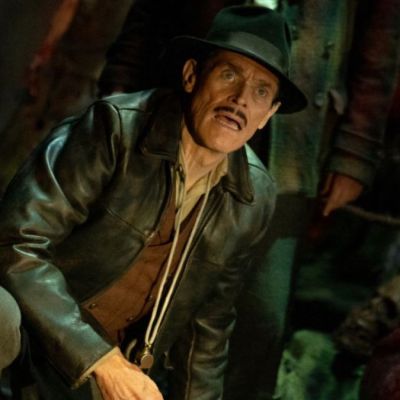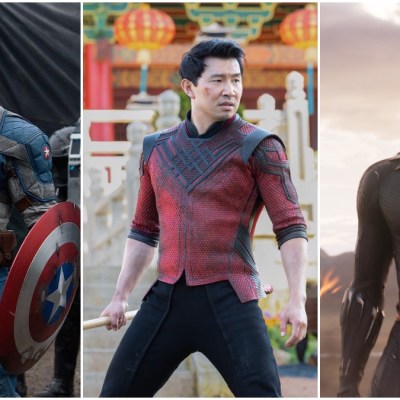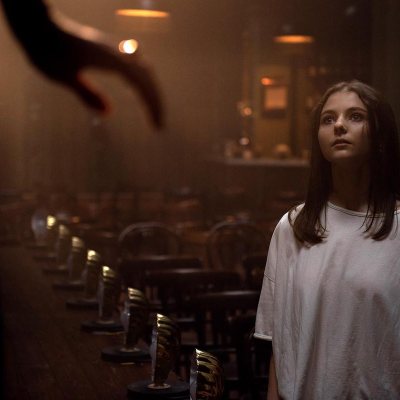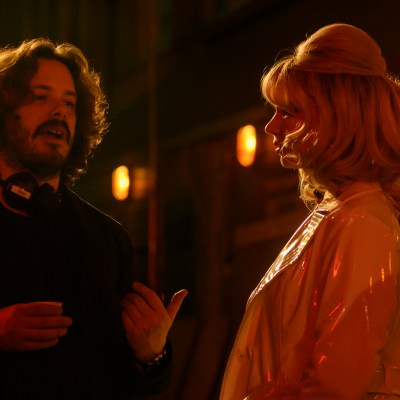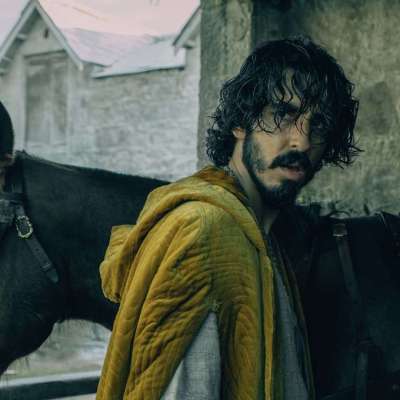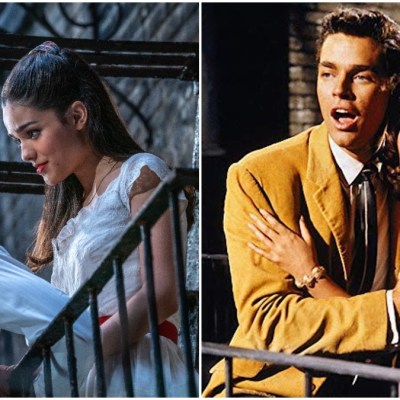The Best Movies of 2021
Our staff and readers pick their favorites in cinema from the year that was. Be it mentats or musicals, superheroes or superb horror, here’s the best of 2021.
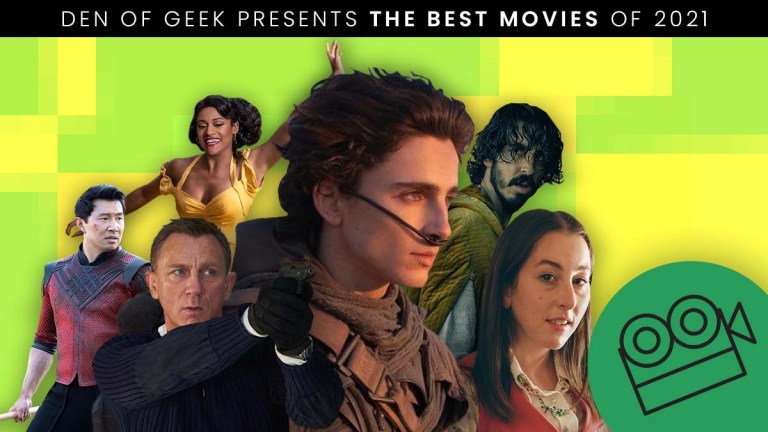
It was supposed to be the year where movies came back. With the pandemic seeming to turn the corner (for a time), and cinemas opening back up around the world, your local theater offered a treasure trove of options, from old reliable favorites via mega Hollywood franchises to respites from the familiar as new voices and stories took center stage.
Twelve months later, things obviously didn’t go as smoothly as we all hoped. While multiplex business has rarely been bigger for superheroes and big balls of alien goo, most other kinds of film have taken a hit, at least on the big screen. Even so, it’s been a significant year for movies as a whole, with audiences still being treated to an abundance of excellence be it in theaters or streaming at home. Indeed, the very notion of what is cinema has blurred further by some of the best streaming experiments of 2021.
Thus below is a ranking and celebration of the year’s best, as decided upon by our polled staff, as well as you dear readers.

25. Black Widow
Scarlett Johansson’s SHIELD superspy finally gets her solo movie… a few years after she was killed off on-screen in Avengers: Endgame. Yes, Black Widow is a prequel, one that fleshes out Natasha’s origin story without actually wasting time on tired superhero movie tropes. Instead, director Cate Shortland delivers something much closer to a traditional action movie than we’ve yet seen from Marvel Studios, including a spectacular extended fight scene into a car chase that ranks among the most thrilling sequences ever delivered by the MCU.
Black Widow is made all the more fun by Florence Pugh’s scene-stealing Yelena Belova, here to make sure the legacy of Black Widow can continue in future franchise efforts. Yelena is so compelling, and Pugh’s performance so charismatic, that she instantly earns her place as a bright new face of the MCU. – Mike Cecchini
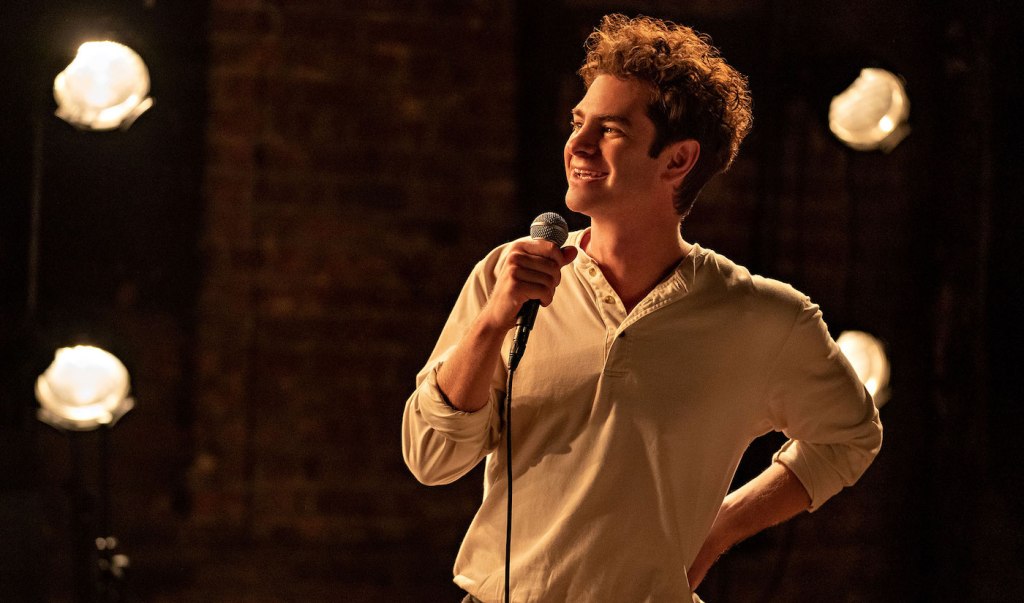
24. tick, tick… BOOM!
The seemingly endless talent of Lin-Manuel Miranda reached new heights this year when the multi-hyphenated writer-composer-actor was revealed as a shrewd film director via tick, tick… BOOM! As the rare film adaptation of a play that exceeds its stage bound origins, Miranda’s film reaches a state of grace as he transforms Jonathan Larson’s one-man show into a poignant musical biopic about the struggling artist who created Rent and then died the night before its first performance.
tick, tick… BOOM! shares space with many narratives about the desperate artist who chooses suffering over security, but Miranda tackles the material with genuine affection as well as a bitter knowingness which escaped the screen version of Rent and a Hollywood adaptation of Miranda’s own work earlier this year. He’s also aided tremendously by a tour de force performance from Andrew Garfield. Vulnerable and arrogant, self-loathing and gregarious, Garfield has never been better than when he channels Larson from the dead, which is all the more impressive when one realizes he’s not even a natural singer. Even so, this is nothing short of a career high note. – David Crow
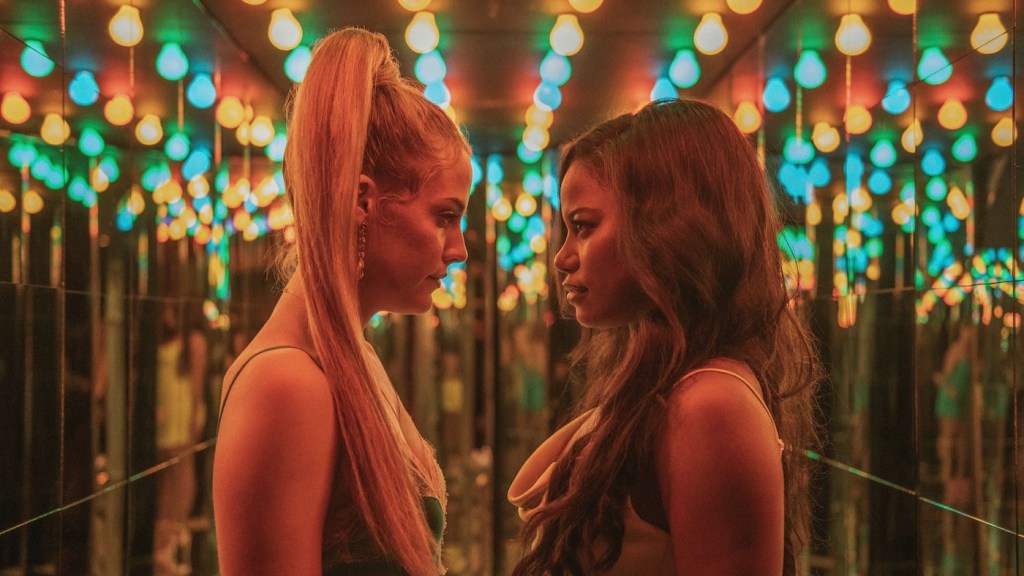
23. Zola
We’re not sure how we feel about movies based on Twitter threads as a rule, but that could just be old age talking. Because Zola is exactly that, and it’s wild: a raunchy combination of crime thriller and bizarro comedy based on a 148-tweet thread by a real-life restaurant worker and stripper named Aziah “Zola” King, which was subsequently turned into an article in Rolling Stone. In the strange tale, Zola (Taylour Paige) is convinced by a new friend named Stefani (Riley Keough) to head out on a road trip from Detroit to Florida for a lucrative stripping gig, only for it to turn into a surreal, dangerous excursion involving prostitution, murder, and a whole host of unsavory characters.
While the real Zola has admitted to embellishing some aspects of the story, it still makes for compelling viewing in director Janicza Bravo’s highly stylized and pulsating second feature. Paige and Keough are fearless as Zola and Stefani while Colman Domingo inspires true dread as Stefani’s “roommate,” who turns out to be her pimp. It may be hard to find a lot to admire in these characters—one has to wonder what even the steadfast, reasonably virtuous Zola was thinking when she went on this trip with strangers—but Zola sucks you into its seedy world like an irresistible club beat. – Don Kaye
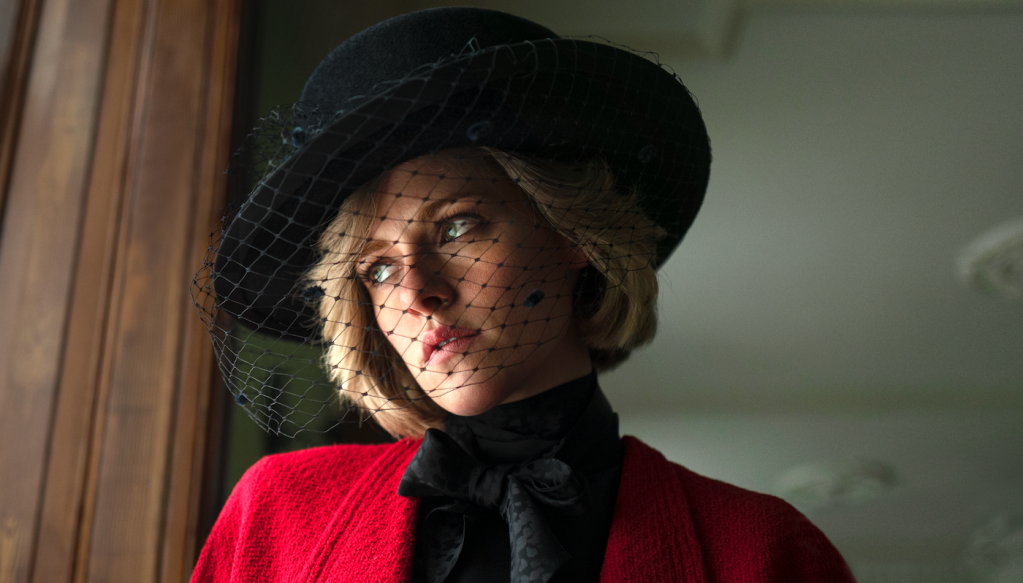
22. Spencer
Who was Diana Spencer? Despite being one of the most famous people of the late 20th century, and one whose life story is marred by tragedy and an eternal media fixation, there remains an elusive mystique between the conflicting reports and biased narrations. And it’s in that ambiguity where Pablo Larraín’s Spencer thrives. This highly fictionalized bit of speculation about the last Christmas Eve shared between Princess Diana (Kristen Stewart) and the Prince of Wales (Jack Farthing) is a biopic in a microcosm—a life lived in a fishbowl as glimpsed here from behind a magnifying glass.
This unconventional approach turned off some, but for us it was a uniquely honest portrait: the life of a royal realized neither as a dignified drama or campy satire. Spencer is the stuff psychological horror; a movie that has more in common with Repulsion than The Crown. The approach gives voice to the anxieties that chased Diana to her doom, as well as enough room in its long weekend setting to let the many complexities of the woman breathe, as realized by a searing Stewart. Is this a portrait of the real Diana? Who really knows, but it does her justice all the same. – DC
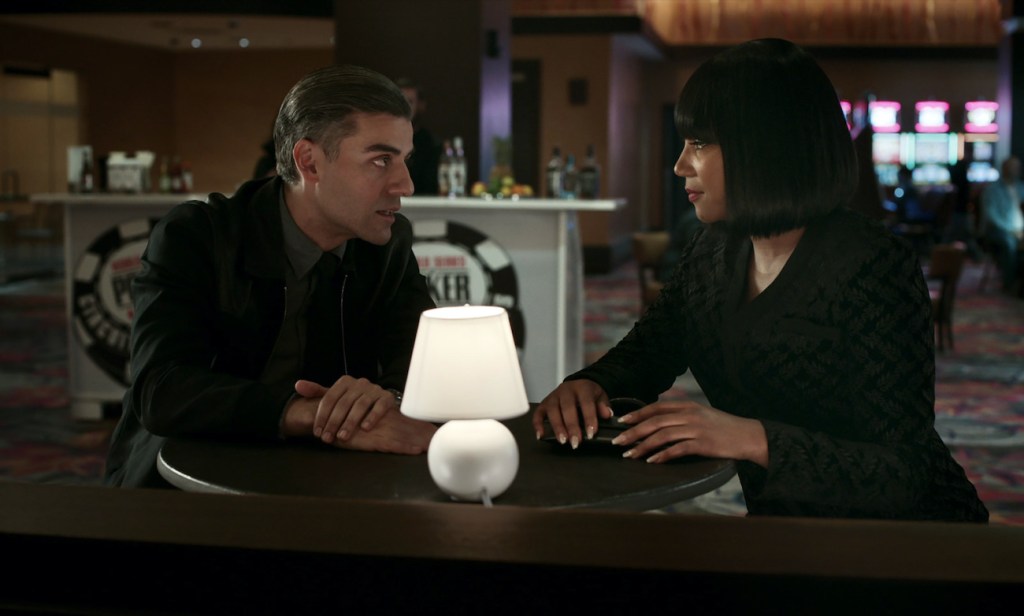
21. The Card Counter
Don’t let the title fool you: writer-director Paul Schrader has more on his mind than the intricacies of of a double bluff in The Card Counter. Ostensibly the story of a third rate professional poker player, a small stakes gambler (Oscar Isaac) who never wants to raise his bid, the bittersweet at heart of Schrader’s follow-up to the Oscar nominated First Reformed is how it unfurls its true intentions and explores the scars left by trauma, shame, and even generational betrayal.
Isaac’s William carries deep secrets, which when laid bare may either save or damn the young man (Tye Sheridan) he’s trying to put on a better path. No matter the outcome though, the filmmaker and his whole ensemble achieve a kind of cinematic absolution, finding dignity from decades of horror as told by every wounded glance on Isaac’s lined face, and by those faces that look back at it—be they as sinister as Willem Dafoe’s smiling all-American Gordo or as guarded, yet open, as Tiffany Haddish, who plays against type as the only hustler here who can actually back her gambits. – DC
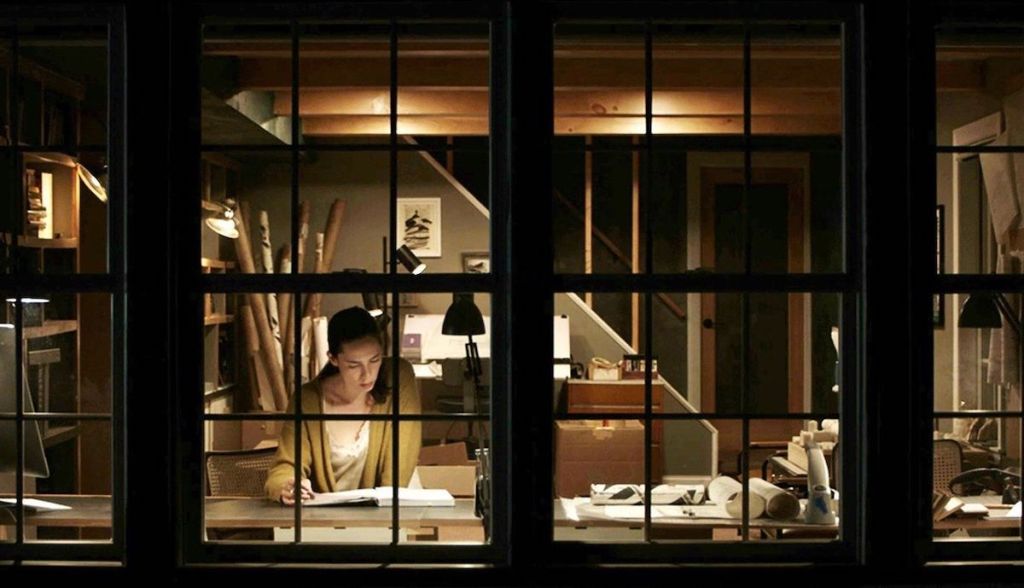
20. The Night House
There’s a case to be made that The Night House is the best horror movie of 2021. Director David Bruckner’s (The Ritual) film stars Rebecca Hall as a teacher who’s mourning the apparent suicide of her husband, only to find out that he was hiding secrets—both in the house he designed for them and in the remote lakeside area in which he built it. Nothing quite unfolds the way you might expect it, and the film’s payoff is both frightening and moving.
The Night House ticks off so many boxes for what makes great horror stand out from the rest of the genre: a character you care about, a sense that the external menace is a manifestation or reflection of the protagonist’s internal conflict or pain, and a genuine sense of dread and unease peppered with genuine scares. The Night House has all of these, along with a typically brilliant performance from Hall as a woman who goes through grief, rage and ultimately understanding. Kudos to her and Bruckner for delivering a classy horror film that too few people have seen. – DK
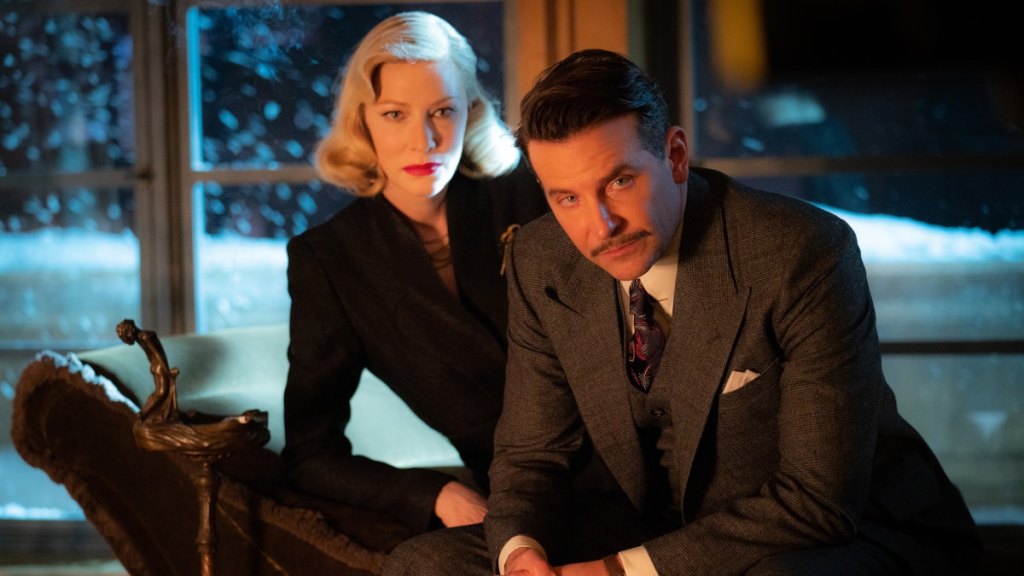
19. Nightmare Alley
With this adaptation/remake of William Lindsay Gresham’s 1946 novel and the 1947 film based on it, Guillermo del Toro delivers his best film since 2006’s Pan’s Labyrinth. That’s not to say his others—including 2017’s Best Picture winner, The Shape of Water—were poor outings; rather Nightmare Alley hits nearly all the marks that some of the others missed along the way. At two hours and 30 minutes, it moves quickly and yet slow burns its way through its twisting storyline, introducing us to a memorable lineup of characters portrayed by a perfect cast.
Bradley Cooper stars as Stan Carlisle, a low-level grifter who stumbles into a job as a carnival worker circa 1939 and soon discovers the secret to a scam he runs at the highest levels of wealth and power. The message of del Toro’s noir thriller is clear: power and greed will destroy all who touch them, and usually the only thing you find at the end of the line is someone better at it than you. The director’s recreation of a Depression-era traveling sideshow is immaculate, and even when the film moves to the corridors of big city power, there’s a sense that the freaks are still in charge, only worse. Del Toro’s outstanding film is his first without any fantastical or supernatural elements—but just as chilling. – DK
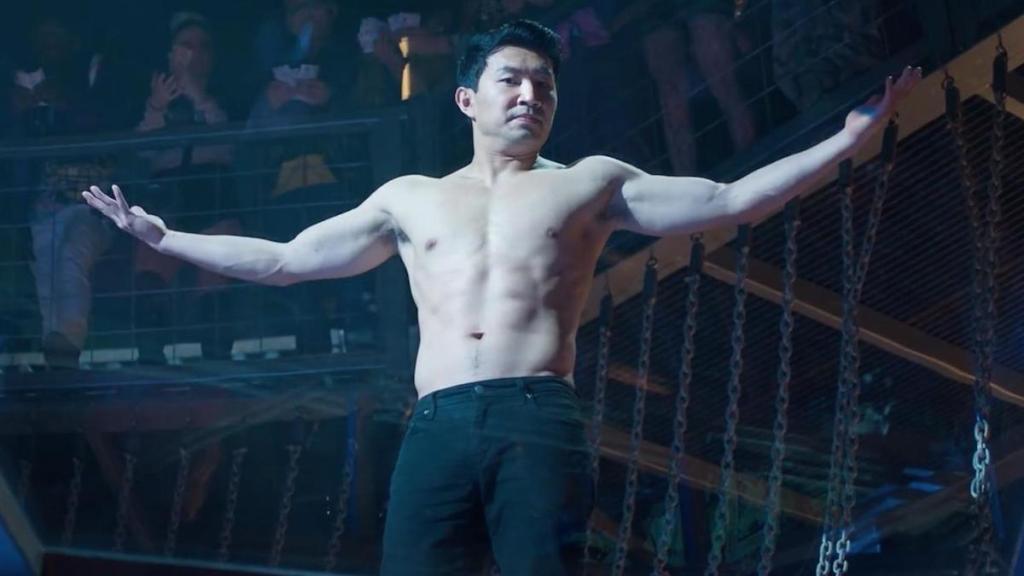
18. Shang-Chi and the Legend of the Ten Rings
Grounded by a characteristically gripping performance from Hong Kong cinema veteran Tony Leung, Shang-Chi and the Legend of the Ten Rings was one of the biggest successes of the year for what is arguably the biggest film studio in the world. Not only did it give MCU fans some of the best fight and action scenes in the franchise’s history; but it centered a diverse cast of Asian and Asian American actors, bringing more meaningful inclusion into an MCU that desperately needs it.
The film follows Simu Liu as Shang-Chi/Shaun, a man who has run from his abusive father, Wenwu (Leung), the immortal leader of criminal organization the Ten Rings. So when the Ten Rings come to take the powerful pendant his deceased mother left him, Shang-Chi is pulled back into the world of his father, along with his best friend Katy (Awkwafina), who acts as an audience surrogate to this world of martial arts magic.
Shang-Chi employs a relatively familiar superhero plot structure, but the film is elevated by its stellar cast, crisp fight choreography, and thematic commitment to exploring an experience of Asian diaspora. While the film suffers from the common MCU problem of an overstuffed and visually muddled third act, the movie’s climax includes both a dragon and Michelle Yeoh, which means there is still plenty to celebrate in the messy ending. With Shang-Chi, director Destin Daniel Cretton successfully built a new corner of the MCU, one that feels exciting and fresh with narrative possibility. In the process, he also made one of the most enjoyable films of the year. – Kayti Burt
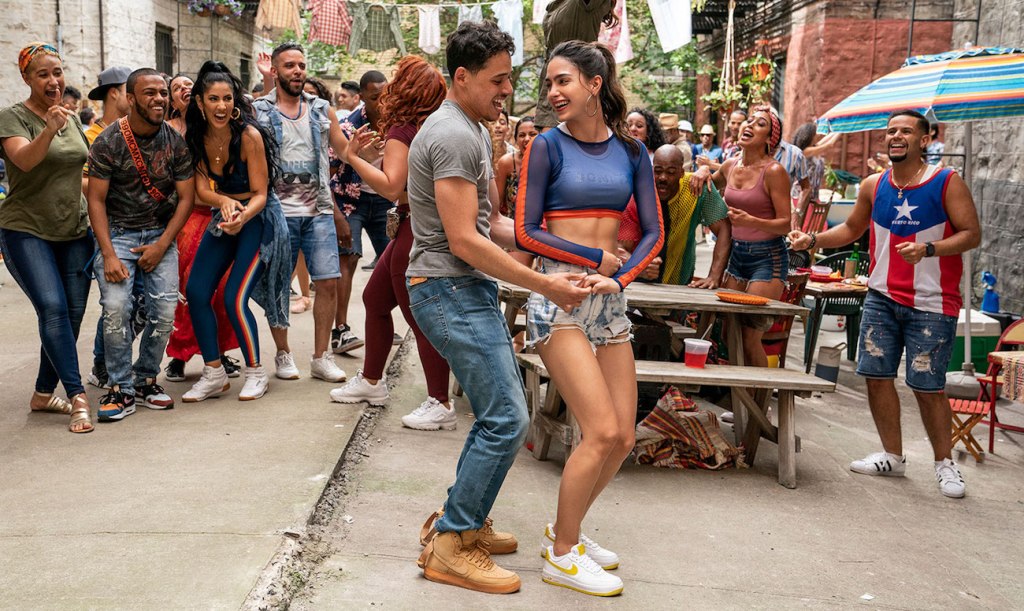
17. In the Heights
Musicals have been hit or miss—both in terms of quality and box office—for decades, and that tradition continued in 2021. But for every creative misfire like Dear Evan Hansen, there was a vibrant, passionate, joyful experience like In the Heights. Based on the Broadway show by a pre-Hamilton Lin-Manuel Miranda and Quiara Alegría Hudes (the latter of whom also wrote the film’s screenplay), Jon M. Chu’s film bursts off the screen with an undeniable zest and energy while providing both a sweet look at young love and a moving view of life in a modern immigrant community.
The cast features Anthony Ramos, Leslie Grace, and Melissa Barrera in breakout roles. Meanwhile Corey Hawkins, Jimmy Smits, Daphne Rubin-Vega and especially Olga Merediz as Abuela Claudia (a role she originated onstage) provide tremendous support through their quickly sketched but colorful characters. Yes, there are some maudlin moments, but In the Heights is so earnest, so honest, and so full of love for its characters, its dancing, and its environment that one cannot help but be swept up by it. It did not connect with a massive audience upon its initial release; hopefully that will be rectified in the years to come. – DK
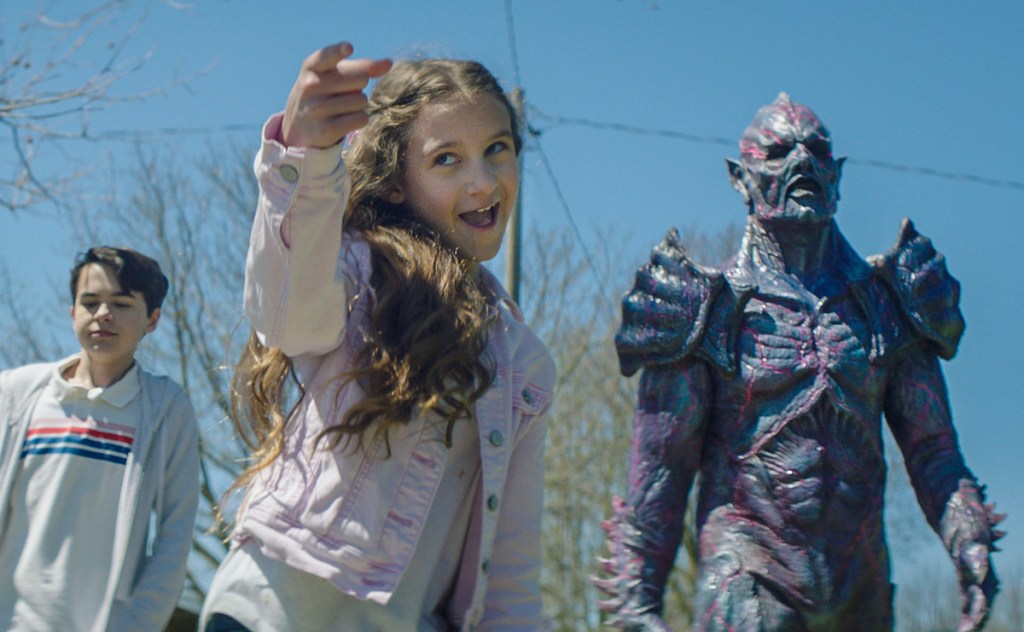
16. Psycho Goreman
A hilarious, filthy, and perfectly crafted 99 minutes of sci-fi horror weirdness, Steven Kostanski’s Psycho Goreman is all of your VHS rental/heavy metal album cover dreams and nightmares come screaming back to glorious life. A perfect blend of ‘80s gross out horror, rubber-suited practical effects, and lovingly designed alien creatures, Psycho Goreman is the perfect antidote to the sterile sensibilities of so many modern blockbusters. If you haven’t yet experienced this not-at-all heartwarming tale of what happens when two misfit kids accidentally dig up a monstrous alien warlord who has no choice but to obey them, you’re in for some fun. – MC
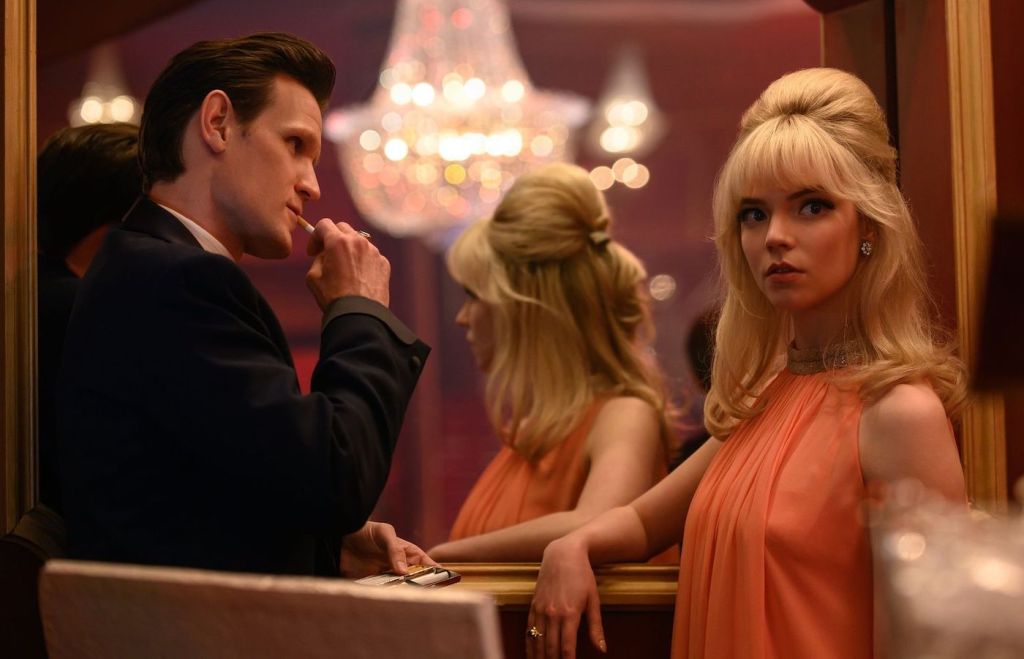
15. Last Night in Soho
Edgar Wright’s Last Night in Soho is the greatest gift to ghost stories since M. Night Shyamalan’s The Sixth Sense; and its final twist perhaps even more exquisitely subversive. It is a dream turned nightmare, which deviates from the trapped soul narrative and puts an incisive variation on female empowerment, however perversely justified. Someone died in every room of every building in London’s legendary Soho district, and every spirit has a story to tell.
In this setting, rising fashion student Eloise (Thomasin McKenzie) doesn’t only talk to dead people, she is inspired to create perfect ensembles for the likes of such phantoms as the ethereally magnetic nightclub singer, Sandie (Anya Taylor-Joy). But some colors are designed to clash in this giallo-infused neon horror show. Wright conjures spirits of celluloid past like Carnival of Souls, Suspiria, and Roman Polanski’s Repulsion. Even John Landis’ An American Werewolf in London bleeds through as dreams within dreams turn into lucid and lethal nocturnal missions.
But the reason it works so well is because Last Night in Soho is a celebration. It is a fawning love letter to swinging London. Brilliantly evocative cinematography captures the lights, shadows, fog, and throbbing strobes while Wright lays down the rhythm. From the moment Eloise drops that needle on the vintage Dansette record player, the film is transported to a land of 1,000 dances. Wright invokes sonic spectral evidence from 1965 Soho and present day London. The movie title itself comes from a Dave Dee, Dozy, Beaky, Mick & Tich single. Come for the ghosts, stay for the songs. But linger in the shimmering darkness to marvel at the era’s most avenging icon, Diana Rigg, in her final role. – Tony Sokol
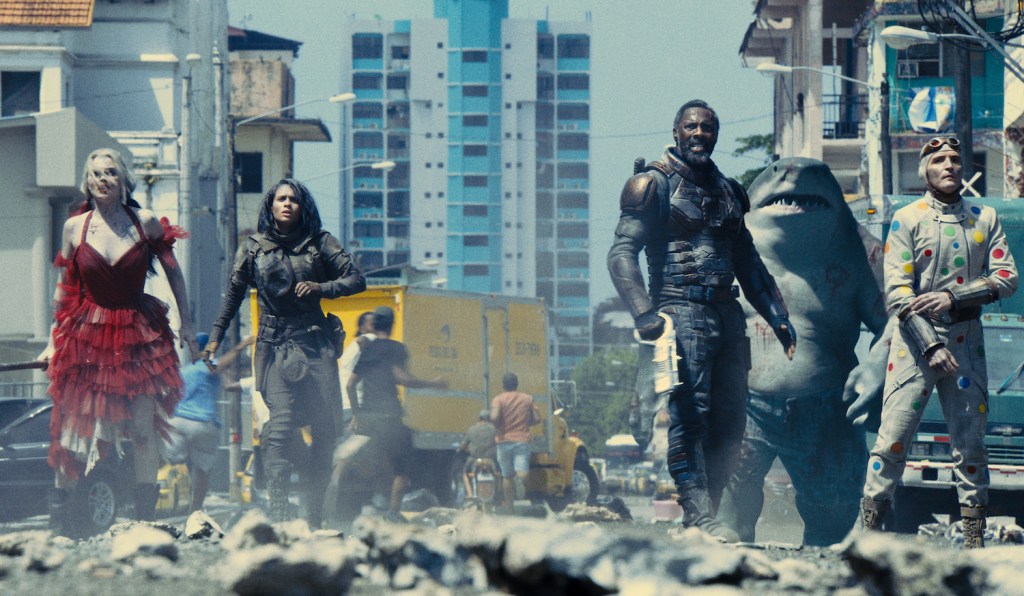
14. The Suicide Squad
For months, James Gunn promised he had complete creative control over The Suicide Squad, his soft and happily demented reboot of a franchise that’s barely five years old. Nevertheless, it was still something of a perverse surprise to see the filmmaker behind Slither and Super left entirely to his own devices in the superhero realm. We’ve loved his Guardians of the Galaxy movies, sure, and Gunn brings a similar emphasis on character and motivation to TSS. But this time he’s unburdened by the concerns of a PG-13 audience or the requirements of a specific studio template.
Hence Gunn’s The Suicide Squad playing like a blood-soaked throwback to the adventure movies of yesteryear, one which mixes the pathos of ‘60s “men on a mission” yarns with the gore and excess of ‘80s blood and biceps spectacle. Through it all, however, Gunn reveals a genuine affection for the losers and neglected of society, allowing characters like “Polka-Dot Man” and “Ratcatcher” (played beautifully by David Dastmalchian and Daniela Melchior) to steal a movie with franchise icons like Margot Robbie’s Harley Quinn—delivering the best live-action depiction of Harley’s chipper madness. It all lands in one of the more slyly subversive big studio movies of the year. Who knew a picture with a giant rampaging starfish could be so thoughtful? – DC
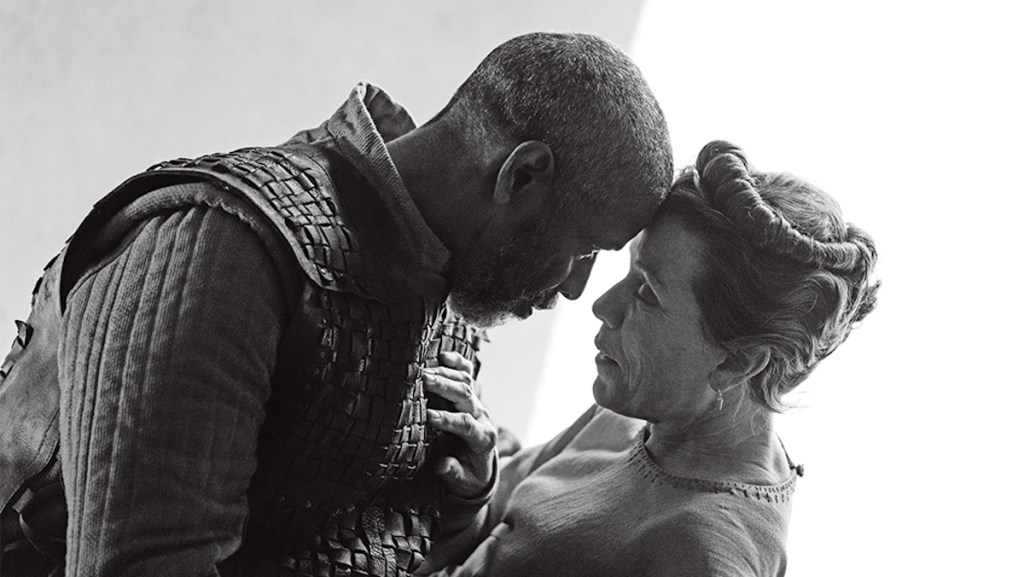
13. The Tragedy of Macbeth
On paper, the idea of a Coen brother directing Denzel Washington and Frances McDormand in a new version of one of Shakespeare’s best-known plays is a no-brainer… and guess what? It’s a no-brainer on the screen, as well. Joel Coen, working solo for the first time in his career since brother Ethan’s reported retirement, turns to the Bard’s classic tale of political ambition, murder, and madness. And he transforms the material into a cinematic thing of beauty: an Expressionist nightmare, creating a surreal fusion of stage and film that reimagines the Scottish play into a true horror movie.
As one might expect, Washington and McDormand are sensational as the doomed, corrupted Macbeth and his equally lost wife, and what a joy it is to hear them emote Shakespeare’s immortal lines. Kudos as well to the rest of the cast, including Corey Hawkins, Harry Melling, Bertie Carvel and Brendan Gleeson, but special attention must be paid to Kathryn Hunter, in an astonishing physical performance as the Three Witches. The sound design, cinematography, and imagery are all top notch. – DK
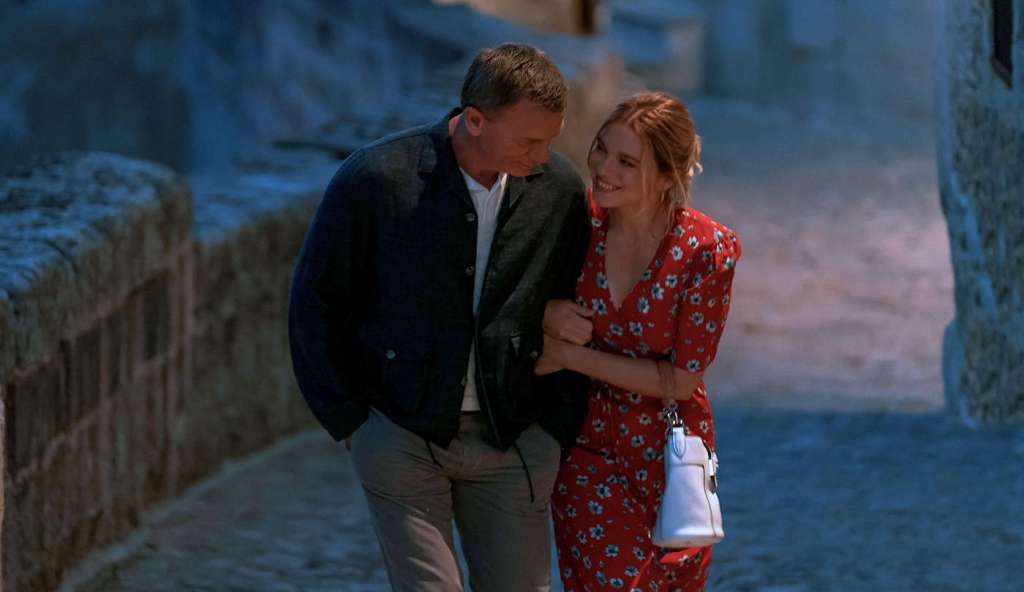
12. No Time to Die
What if James Bond wanted to be more than James Bond? It’s a pretty audacious premise for a franchise that’s traded in male fantasies and what we might call old-fashioned notions of masculinity for over half a century. Nevertheless, that is just what Daniel Craig and Eon Productions’ army of collaborators attempt with No Time to Die, the fifth and final 007 movie starring Craig as Bond. More impressive still, they mostly pull it off with gusto and a cheek that’s been largely absent during Craig’s era.
To be sure, Craig is the centerpiece of this Bond epic, giving the most layered and brooding Bond performance ever put to screen. But director and co-writer Cary Joji Fukunaga also injects a bit of whimsy and mirth to the proceedings, making this a livelier adventure than at least the last three Bond flicks, as well as one that retroactively improves on the dour Spectre (2015) by doing the unthinkable for this series and following up on a leading lady with Léa Seydoux’s Dr. Swann and a previously wasted villain via Christoph Waltz’s Blofeld. It also features some of the most dynamic, in-camera action sequences of the year, such as a dazzling motorcycle and Aston Martin chase through Italy and a Cuban showstopper where Ana de Armas proves there are no small parts by stealing a three-hour movie inside of 15 minutes.
It’s the best popcorn entertainment you could have at a theater this year, even as it boldly goes on to be the first Bond movie in 50 years to leave you in tears. – DC
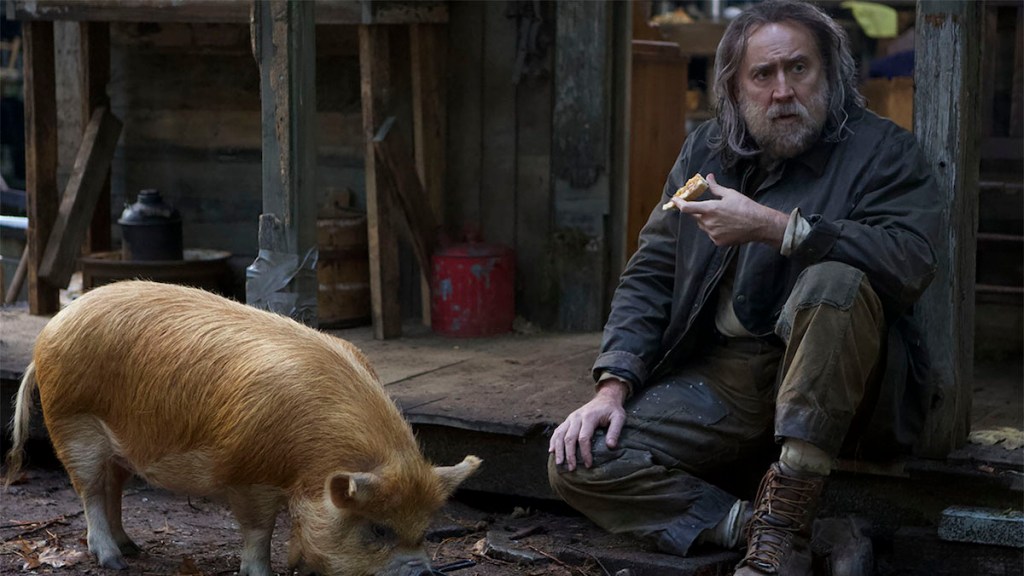
11. Pig
Every time you think you know where Pig is headed, it subverts expectations, revealing itself to be more soulful and patient than anticipated. First time feature director Michael Sarnoski could have easily turned the premise—a man on a quest to retrieve his prized, stolen truffle pig—into a cheap John Wick knockoff with gonzo Nicolas Cage subbing into the Keanu role. Instead Pig offers up something deeply human and emotionally complex, exploring grief, familial resentment, and the artifice of the Haute Cuisine world.
The film’s unique setting—where Cage plays a former rock star chef from the Portland food scene who’s retreated to isolation in the woods, save for the company of his hunting pig and a food buyer named Amir (Alex Wolff)—provides the space for audiences to draw their own conclusions. It’s a film comfortable with its meditative tone and and offbeat strangeness. But the real power comes from Cage. It’s an understated performance that draws on the actor’s real-life persona.
Just like his chef, some time in the wilderness has led us to underestimate Cage and forget about his immense skill as an actor when given the right material. Forgive the pun, but when you let the man cook, he can deliver something unexpected and undeniably tasty. – Nick Harley
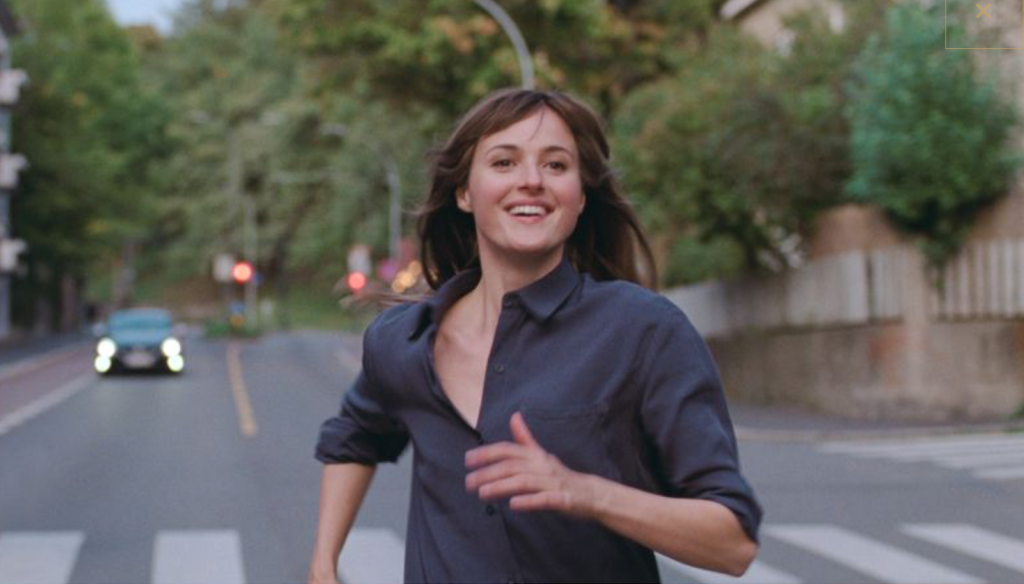
10. The Worst Person in the World
Everyone is somebody’s “worst person in the world,” and in Norwegian director Joachim Trier’s endlessly insightful comedy/drama that person is Julie (Renate Reinsve in a brilliant performance). Like all of us, Julie is a young woman who is finding her way through existence—not with any preconceived notions or plans, but rather by stumbling from one decision to the next, whether it be in love, work, or life in general. Of course, she’s hardly how the title describes her; but along the way she hurts others and she herself gets hurt as well. That’s life.
Trier’s script (co-written with Eskil Vogt) and direction are so rich with the minutiae of everyday occurrences and relationships that it’s hard to imagine even someone who doesn’t like subtitles not finding something to relate to in this funny, poignant and understated film. Reinsve is at times annoying, heartbreaking, frustrating, and enchanting. But following her journey is never less than an empathetic, warm experience. The Worst Person in the World easily finds its place among 2021’s best. – DK
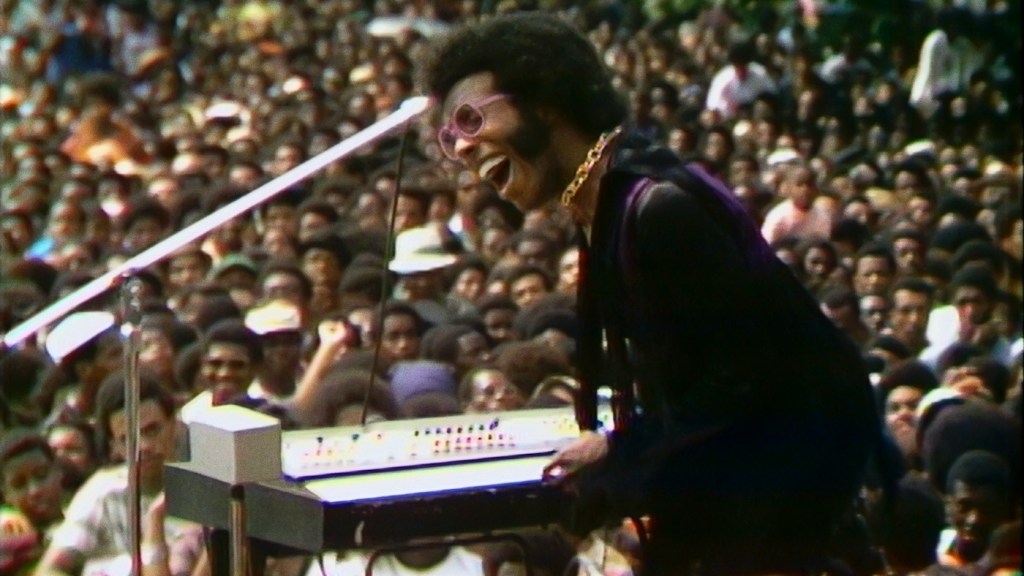
9. Summer of Soul
Ahmir Thompson, better known as Questlove, captures a rose growing in cement in the documentary Summer of Soul. But he doesn’t pick it. He lets the bassists and guitarists who played the 1969 edition of the Harlem Cultural Festival use picks on strings instead. They and the other musicians who backed artists like Stevie Wonder, Mahalia Jackson, Sly and the Family Stone, B.B. King, Gladys Knight & the Pips, Mavis Staples, and The Fifth Dimension, lay down their version of soil. The Rev. Jesse L. Jackson, backed by the grassroots musical unit, Breadbasket Orchestra and Choir, waters it with an almost baptismal immersion. And Questlove lovingly shows how, over the course of six summer Sundays, the festival baked in the city heat to produce a harvest of pure soul.
Nineteen-year-old Wonder kicks it off on drums, syncopated and clean, but oh so dirty. Nina Simone keeps it real, bashing her piano’s ivories while doing the same with her voice, fighting against those who would send her sons to Vietnam in “Backlash Blues.” But when she takes a little-known downtown play uptown on a track laid with melody and backing, she affirms and anoints everyone in that park, neighborhood, and all of the island of Manhattan with ears, as “Young, Gifted, and Black.” The film stands as an important historic reminder that arts, politics, and the church can come together in the midst of quantifiably danceable righteous rage, and the Edwin Hawkins Singers can joyously declare “Oh Happy Day.” – TS
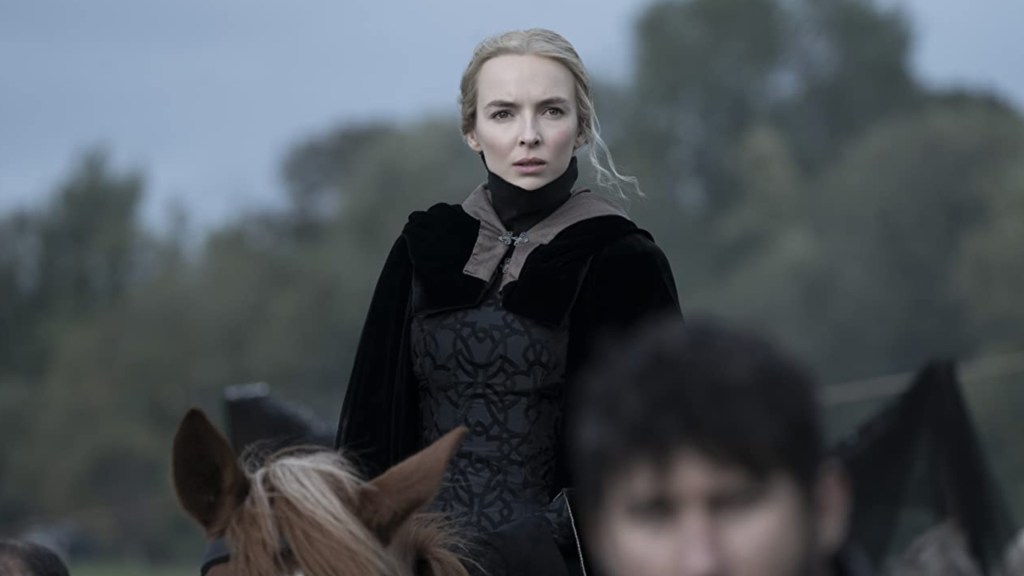
8. The Last Duel
Ridley Scott’s gripping historical drama relates a harrowing incident from three different perspectives—and is relevant directly to today, even if it takes a while to get to the point. The Last Duel stars Matt Damon as Jean de Carrouges, a knight and landowner in 14th century Normandy, whose ongoing feud with nobleman Jacques Le Gris (Adam Driver) explodes when Carrouges’ young wife Marguerite (Jodie Comer) is raped by Le Gris and refuses to stay quiet. The result is a duel to the death between the two men to determine who speaks the truth—with Marguerite facing being burned at the stake if her husband loses.
While the first two sections take the men’s points-of-view, filtered through their egos and pride, the third portion of the film—subtitled “the truth”—belongs to Marguerite, the only one truly violated. That Rashomon approach to exploring this horror from multiple vantages takes its time getting to the heart of the matter: one lonely woman’s stand for justice in a time when her voice was barely acknowledged. But The Last Duel’s considerable power comes from the way that Marguerite’s struggle to be heard and to have the truth come out is almost a mirror image of the way events have played out in modern times, and a forceful reminder that we haven’t come far enough. – DK
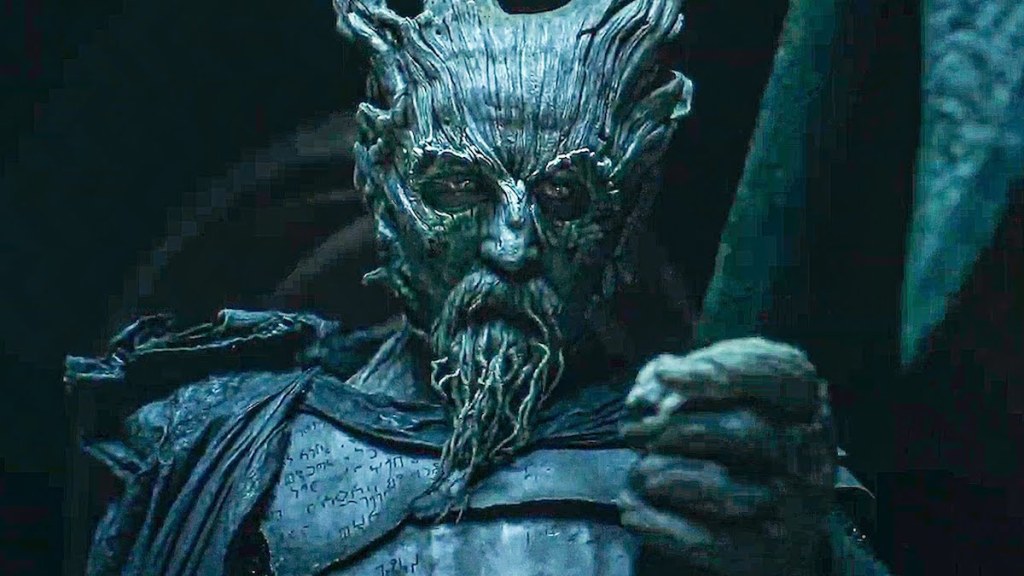
7. The Green Knight
After decades of “reimaginings” and failed Hollywood franchise reinventions, writer-director David Lowery returns to Arthurian legend to both faithfully adapt and deconstruct one of the stranger medieval poems to survive to the modern day: “Sir Gawain and the Green Knight.” In this wild and hallucinogenic interpretation of 14th century verse, Gawain is depicted as a callow youth brought to agonized life by Dev Patel, and his quest to find a Green Knight who will surely take his head is as much a test of his many foibles as it is his supposed chivalry.
Lowery’s luscious vision, with extravagant production design by Jade Healy and thick prosthetic makeup which causes Ralph Ineson’s Green Knight to appear as if he were the very wood of Birnam given movement, basks in the fatalism of its story’s paradoxes, and in the ironies that would seem to doom all men who would attempt to live an honorable life, whether their intentions be feigned or sincere. No matter your interpretation, an undeniable gracefulness persists from the movie’s first frame to its final, ambiguous closing shot. – DC
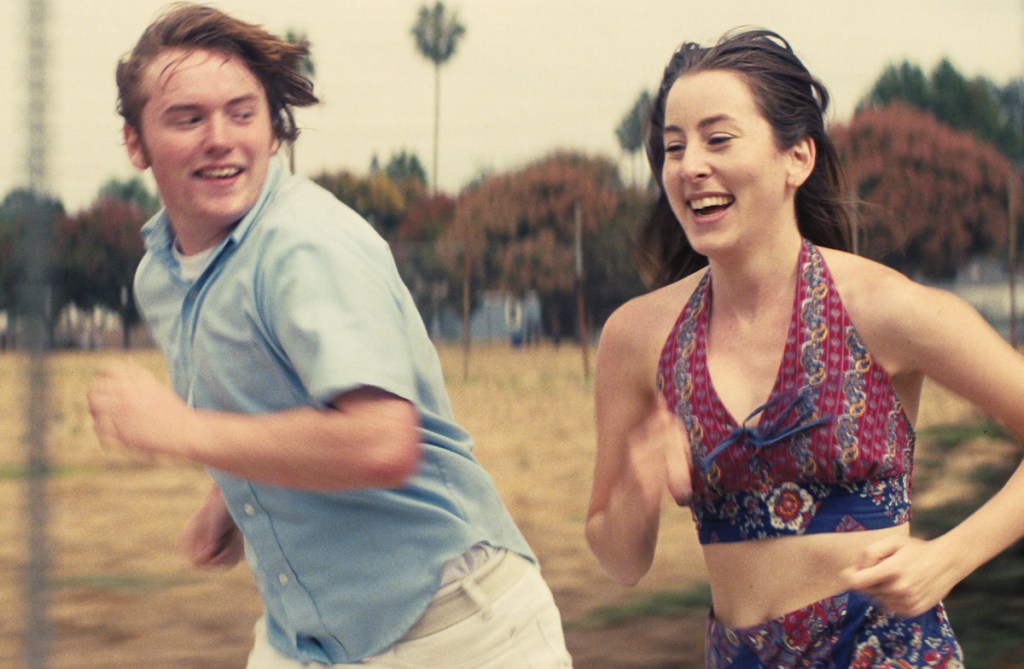
6. Licorice Pizza
A coming-of-age comedy from one of America’s most important filmmakers, Paul Thomas Anderson’s Licorice Pizza crosses the real-life childhood showbiz exploits of producer Gary Goetzman with Wendy Darling’s Peter Pan narrative arc. First-time feature actors Cooper Hoffman—who is the son of the late, great, and frequent Anderson collaborator Phillip Seymour Hoffman—and Alana Haim, the youngest sister in the acclaimed Haim rock trio, play Gary and Alana. Under different circumstances they might be star-crossed lovers, but they’re kept apart by a sizable 10-year age difference. Nonetheless, they’re still unable to escape each other’s orbit in early ’70s Los Angeles.
The shaggy, loosely plotted film follows the pair as Gary seeks to make a buck in the seemingly adult-free Valley while Alana attempts to find a life direction, whether as an actress, politically conscious volunteer, or something else. Interestingly, she repeatedly returns to Gary and his crew of Lost Boys, playing the role of mother, co-conspirator, or just-out-of-reach love interest, depending on the day and situation. Meanwhile her interactions with older men, who are just as reckless, immature, or dishonest as adolescent boys, reinforce the warmth she feels for Gary.
The film plays like someone recounting wild tales from their youth—“Do you want to hear about the time I started a waterbed business?” “Did I ever tell you about how I was falsely picked up on murder charges?” “Have you ever heard of Jon Peters?!”—but the funny vignettes hold together due to a strong sense of place and time. It’s a love letter to PTA’s youth and to cherishing people that make you feel special. – NH
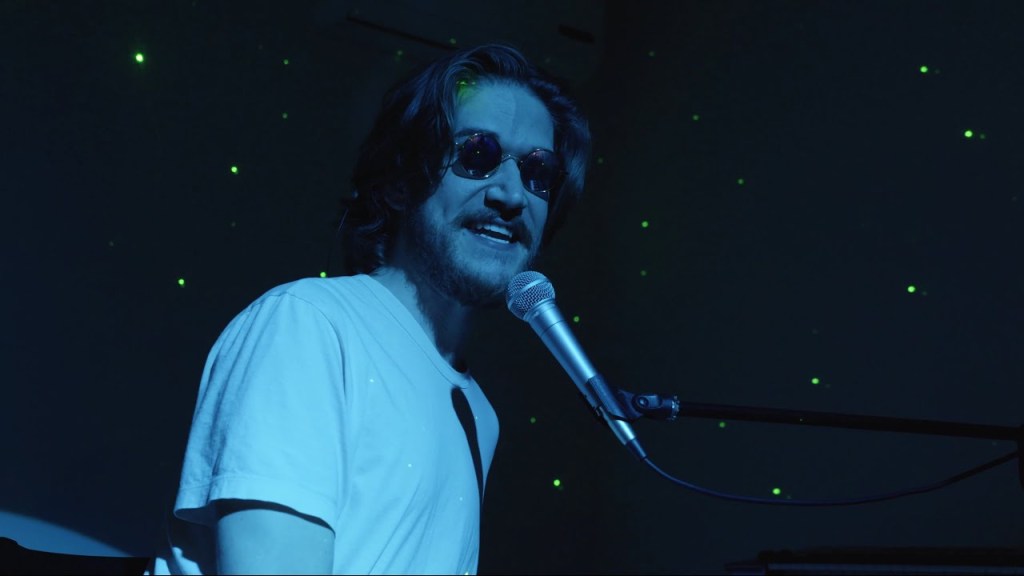
5. Bo Burnham: Inside
What will certainly be the defining work of the pandemic era, Bo Burnham’s deeply personal, often hilarious document about trying to create art during the uncertainties and isolation of 2020, make his latest comedy special feel more like cinéma vérité than standup. That’s not to say there aren’t jokes—the work is consistently funny, silly in places, and not entirely focused on Burnham’s personal struggles—but Inside is at its best when Burnham is putting his own ego under the microscope, deconstructing his persona, old material, and his place in the world until the comedian is a near-naked mess balled up on the floor. If the content itself wasn’t staggering enough, Burnham also shot, edited, and produced the whole affair, consistently making “guy alone in his home talking directly to the camera” interesting, beautiful, and engaging.
The existential dread and techno-anxiety on display certainly make Inside feel like a document of our times, but it also works as a movie musical. Burnham expresses his characters’ inner-thoughts, fears, and desires via song throughout a contained narrative, in this case the narrative being one man trying to occupy himself during a pandemic. It has ballads, charm songs, comedy numbers, “I Am” and “I Want” songs, and a big reprise. By capturing his personal pandemic experience and putting the whole affair to music, Burnham has created one of the most compelling (and catchy!) accounts of life during 2020 and beyond. – NH
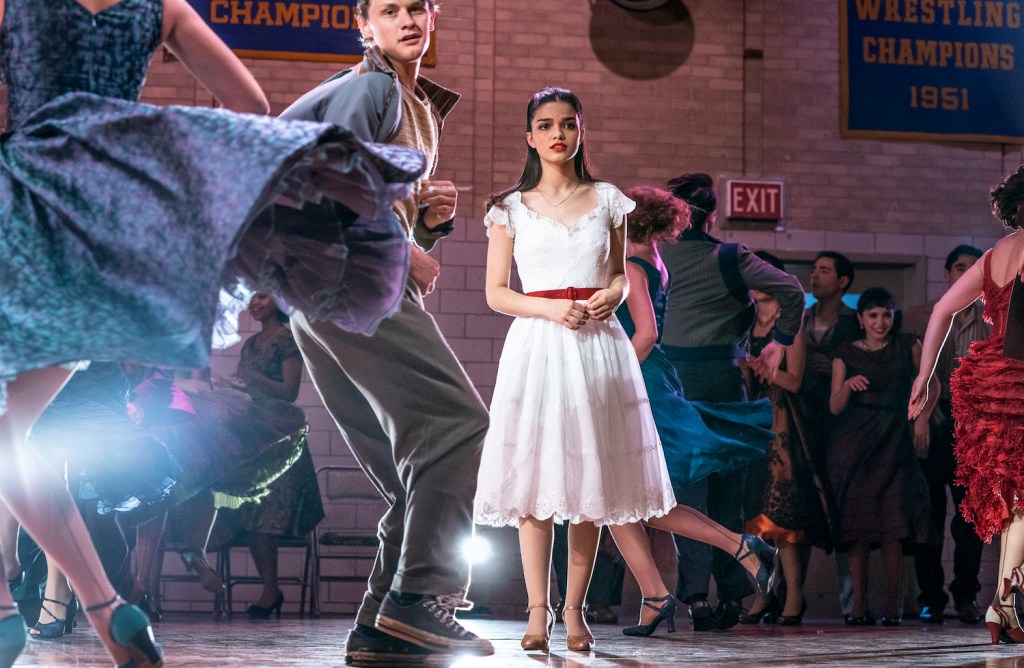
4. West Side Story
Steven Spielberg waited his whole career to make a full-throated musical. After how majestic this reinvention of West Side Story turned out to be, let us hope he moves a little faster on the follow-up. Despite all the justified skepticism and suspicion about the master trodding on the sacred (and problematic) ground of a classic like the 1961 Hollywood version of Leonard Bernstein and Stephen Sondheim’s musical, Spielberg makes it his own with a fresh vitality and a surprisingly youthful exuberance. Genuinely, the 75-year-old director’s camera movements have not seemed this playful or excited since Catch Me If You Can.
That singular gift for camera blocking is thus used to craft an intimate and intoxicating love story. Yet Spielberg and screenwriter Tony Kushner also take the opportunity to address some of the flaws in the original stage show and film by striving for an authenticity in the Puerto Rican side of the “Sharks versus Jets” dichotomy, and by casting instant stars like Rachel Zegler and Ariana DeBose in fuller roles. Similarly, by taking advantage of hindsight, and re-contextualizing West Side Story as a period piece, the film is able to trace the problems of today to the class, culture, and racist divides of 60 years ago.
Beyond its many added layers though, this remains a soaring spectacle where one of the greatest filmmakers of all-time goes for broke and visualizes his favorite musical—finding a vibrant, pulsing heart still racing beneath those gorgeous songs. – DC
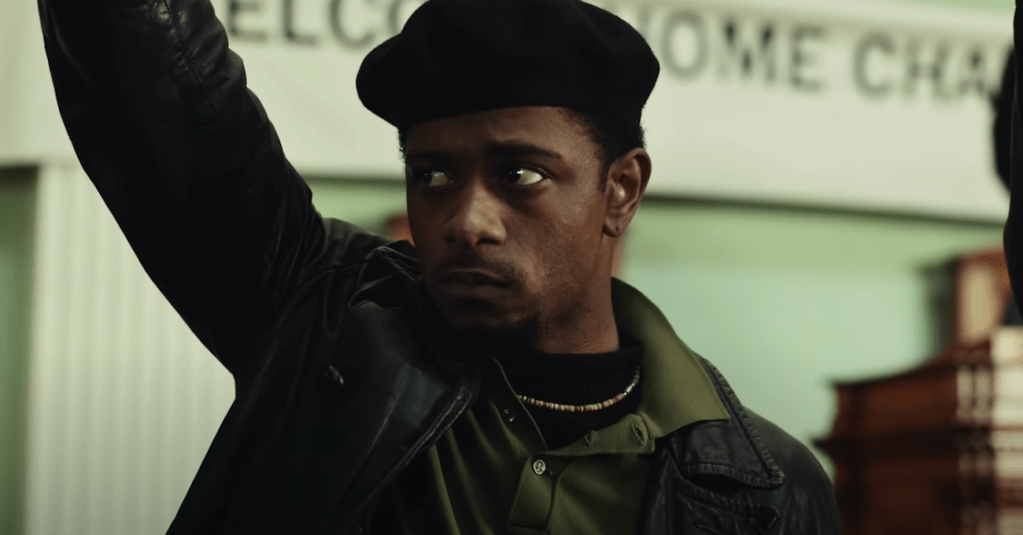
3. Judas and the Black Messiah
Even without the dramatic, true life, historic weight behind it, Judas and the Black Messiah is a powerful cinematic work of unflinching beauty, and an ugly emotional recounting of justice that’s been far more than simply denied. Daniel Kaluuya is as gifted an actor as any generation has produced. He can transmit a number of contradicting emotions with a glance, a glare, or a blink. All this before he even moves his lips. The film is a brutally infuriating encapsulation of the American criminal justice system being used to systematically silence the civil rights movement, one important voice at a time.
Black Panther chairman Fred Hampton’s words inflicted deeper wounds than the bullets which silenced him at age 21. The visionary revolutionary dared to include the disenfranchised dregs of poor white communities and other ethnically distanced victims of society, sharing with his Rainbow Coalition a dream of dignified unity. As a motion picture hero, he bears comparison to both the saloon-keeper and the resistance leader in Casablanca.
Played with the wary eye of a street hustler on the make, Lakeith Stanfield’s William O’Neal knows the cost of betrayal, but still gets screwed for his 30 ounces of silver. Cast as a rat, like some capo in a Sicilian mob family film, he ranks with the loose-lipped masters of The Departed or On the Waterfront. But because he trades on the life of a figure with earth changing potential, O’Neal’s kiss of death takes on biblical proportions.
“All power to the people” was a calling, not a slogan, to the Black Panther’s most measured spokesmen. Judas and the Black Messiah works as a taut political thriller, conspiracy cinema, urban drama, and romantic tearjerker. It is a vital work because it is a historical documentation of an all-too real and much-too-human voice of reason that was unreasonably ripped out by its roots. – TS
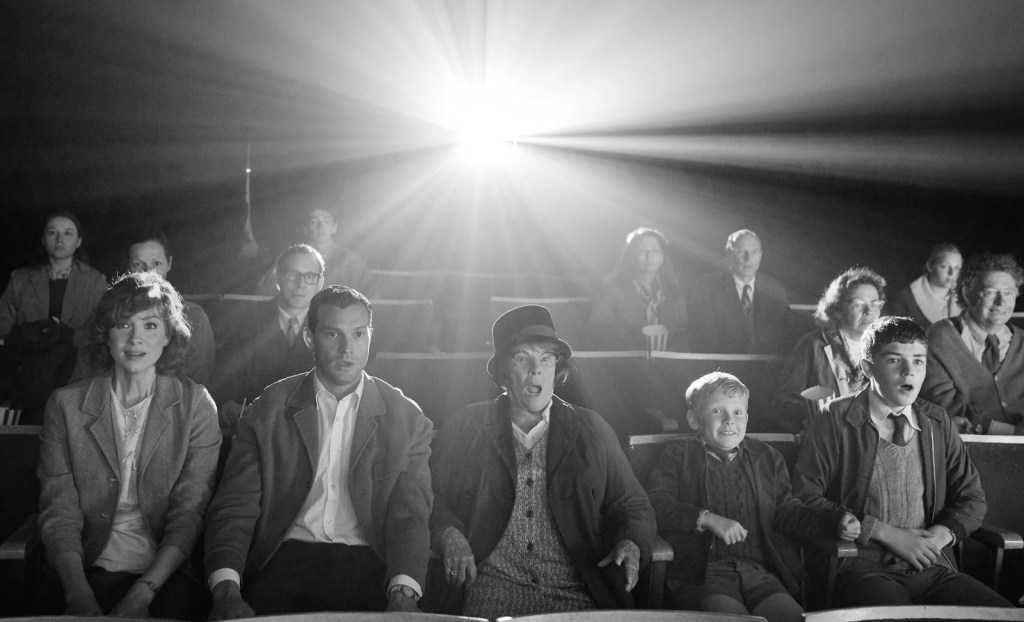
2. Belfast
Perhaps there’s something in the water, because the number of directors who are traveling down memory lane with semi-autobiographical portraits of childhood grows by the day. Even so, Kenneth Branagh’s wistful and unapologetically sentimental Belfast stands out, for here is a happily rose tinted view of decidedly un-rosy times. As the title might tease, the film is set during the late 1960s and the height of the Troubles in Northern Ireland—a moment in history which often pitted neighbor against neighbor, or at least forced those with no such allegiance to consider looking for the exits.
One such family is that surrounding Buddy (Jude Hill), a boy who is having a grand time even as he’s only faintly aware of the tax problems faced by his Pa (Jamie Dornan) and the looming violence that causes his Ma (a terrific Caitríona Balfe) to dread sending her sons out on the streets. Some critics have balked at the movie’s sweetness and obviously fictionalized flourishes where a father looms as large as Gary Cooper in his son’s eyes. And yet, its sentiment is the appeal given the contrast of its setting.
The innocence of childhood—and its existence acting as a testament to the parents who could preserve it—is a worthy thing, which Branagh realizes in his most restrained directorial effort to date. Mimicking the black and white naturalism of Truffaut, and eschewing his own usual bombast, Branagh instills his reverie with the irresistible ring of truth. Plus, a superb ensemble topped off by Judi Dench and a twinkling Ciarán Hinds never hurts. – DC
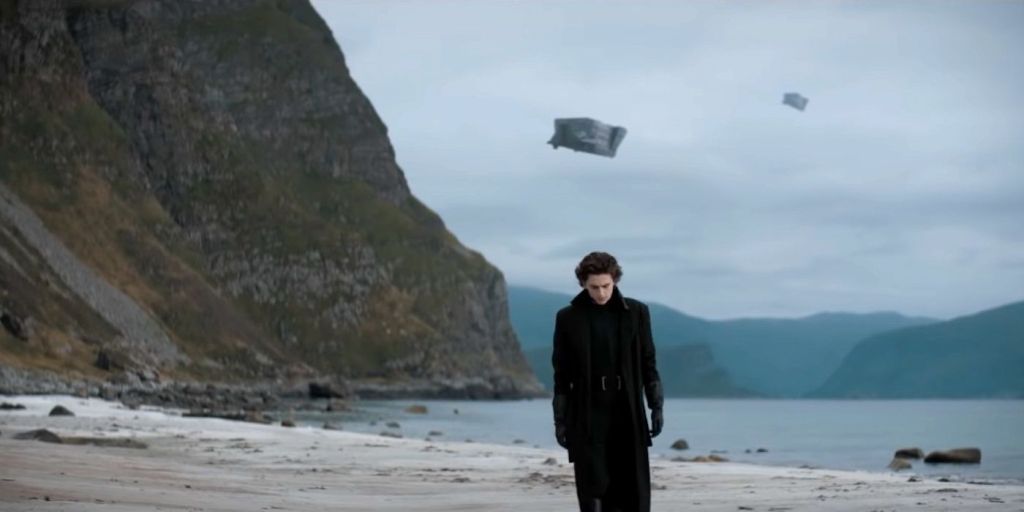
1. Dune (Readers’ Choice)
For all the talk about the divide between audiences and critics, it’s always nice to see a little consensus. For the first time since instituting the combined Den of Geek staff and audience vote for our end of year list, the critics’ pick and the audience’s for best movie of the year have aligned. And really, it’s the perfect movie to do it with: Dune.
It’s rare to see a director given such complete control over a franchise-starter (Denis Villeneuve is taking two movies to adapt the first book in Frank Herbert’s series, and hopes to film a third based on the second book… and there’s also a TV spinoff in development at HBO Max and enough books to keep this going for years). And yet, despite all that long-term fiscal planning, this film is every bit as cerebral and genuinely weird as both its source material and its director’s previous work. Told with the scope of an old-school Hollywood biblical epic, and with an all-star cast (and runtime) to match, Dune is one of the most stunning pieces of sci-fi worldbuilding ever put on film–completely immersive in every visual and auditory detail. It’s so good that Hans Zimmer’s possibly career-best score feels like just a bonus rather than the stunning achievement it is on its own.
While Dune isn’t a perfect film (the mountains of clinical and remote exposition it requires characters to deliver, the almost anticlimactic point where it chooses to divide the source material, the valid criticisms about its treatment of MENA issues), it’s still the rarest of birds in the current blockbuster landscape: a bona fide work of genius so rich and beautiful in its execution that future sci-fi epics will have to measure themselves against it for years to come. – MC
Other films that received votes: The French Dispatch, The Velvet Underground, The Harder They Fall, The Power of the Dog, Spider-Man: No Way Home, Malignant, King Richard, The Sparks Brothers, Cryptozoo, Passing, Cyrano, The Matrix Resurrections, Barb and Star Go to Vista Del Mar, Cruella, The Lost Daughter, Swan Song, Lamb, Cliffwalkers, I Care a Lot, No Sudden Move, Raya and the Last Dragon, The Mitchells vs. the Machines, In the Earth, Being the Ricardos, Free Guy, Drive My Car, Don’t Look Up, Eternals, House of Gucci, Godzilla vs. Kong, Stillwater, Val, Werewolf Within, Encanto, Seobok, The Djinn, Map of Tiny Perfect Pretty Things, A Quiet Place Part II, The Many Saints of Newark, Ghostbusters: Afterlife, and To All the Boys: Always and Forever.


